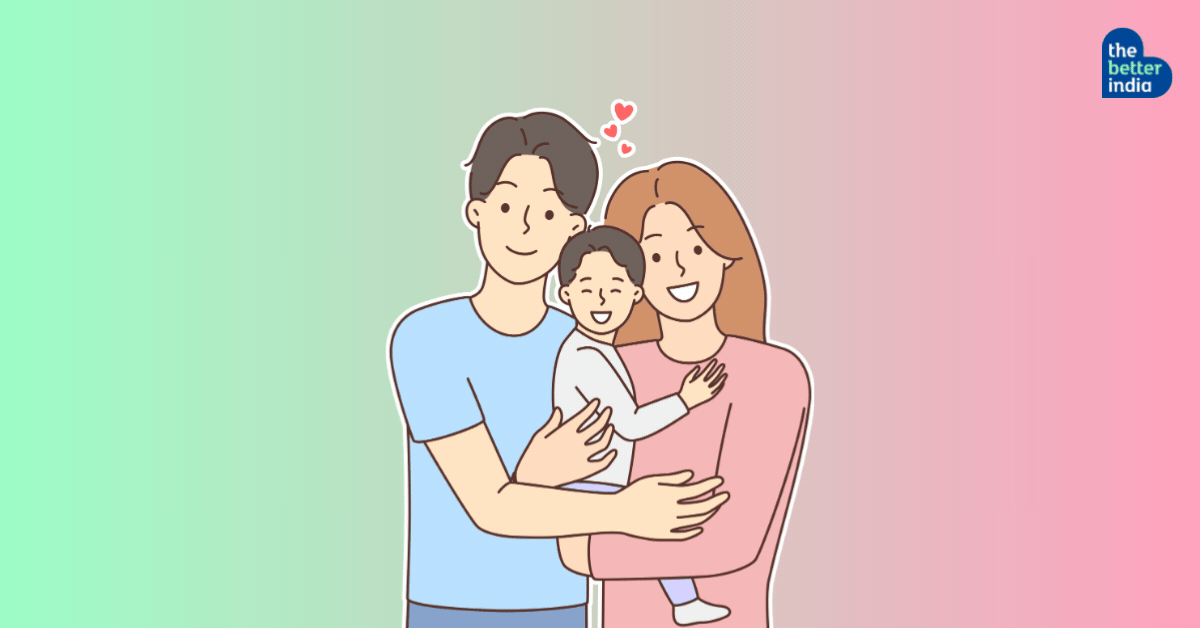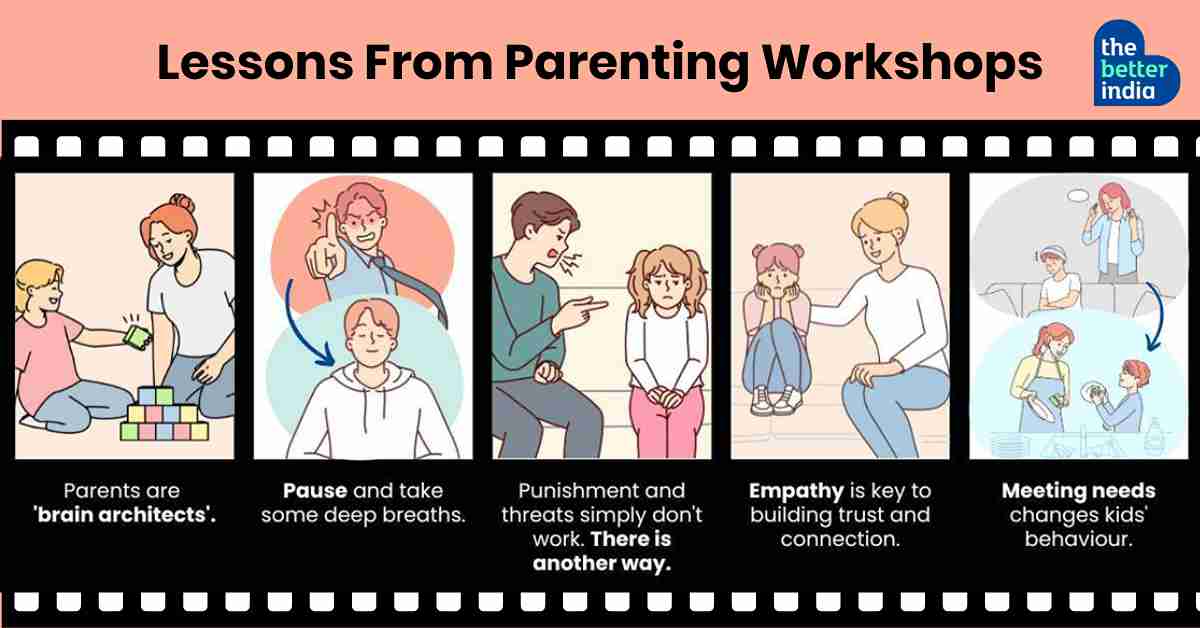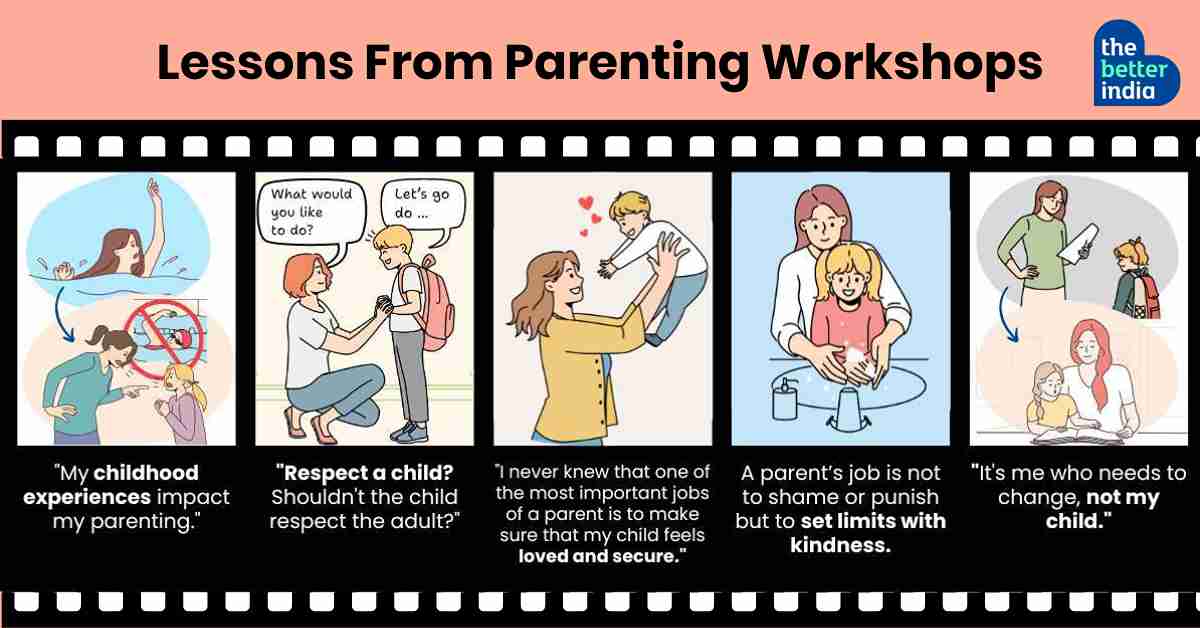One of the most commonly debated questions of the modern times is whether parenting can be taught. Many of us assume that we know how to parent based on our upbringing; yet that’s where the challenge lies.
Do we truly understand the brain development of a child and what helps them thrive? Or do we simply parent on autopilot, doing what was done to us — operating on force and authority rather than offering respect and understanding?
This balance is often tilted when we become too permissive and bend over backwards to please our children because we didn’t like how we were parented.
To top this off, parents today have to also grapple with other dramatic changes facing their kids like consumerism and over exposure to technology.
Over the past 20 years, we at Parenting Matters, have been conducting workshops and courses aimed at parenting for a diverse range of groups and settings.
Using the philosophy of ‘Parenting with Connection’, we have held these parenting workshops for private and government schools, business organisations, neighbourhood groups and for under-resourced communities as well.
Our experience has shown that the questions, beliefs, challenges, and desires of parents are remarkably universal: every parent wants the best for their child.

And which are the lessons that have impacted parents the most?
Here are the top ten concepts that have transformed their lives and relationships with their children:
- Parents are brain architects– Many parents are astonished to learn that their actions significantly influence their child’s brain development. This realisation often sparks a deep interest in understanding how to nurture their children’s brains effectively.
- We have seen how brain science, irrespective of a parent’s educational background, becomes an empowering tool that propels them to try and provide a safe and nurturing environment for their child’s cognitive and emotional growth.
- Pause and take some deep breaths – It may sound clichéd, but parents who practise this see a transformation in how they react to their children. Learning to regulate anger has been life altering to many. Parents come back to share how that ‘pause’, along with the other tools that they learned, helped them calm down and deal with a tough situation (even with their spouses!). This tool breaks the cycle of violence against children. Violence in both words and deeds.
- Punishment and threats simply don’t work. There is another way – Many parents regret yelling at or hitting their kids; it makes them feel terrible. However, they’ve been conditioned to believe that that’s what a good parent is required to do. If you are soft, your children are going to “sit on your head”.
- Parents feel liberated when they discover that there are positive ways to discipline their children as well. Changing and breaking established patterns is not easy. It takes hard work but once they make the change, they share with delight how connection and collaboration with the child works much better than force.
- Empathy is key to building trust and connection – “Why does my child lie to me and hide things from me”, is a question most parents ask. They long for an open and honest relationship with their child. Children lie or hide things to avoid the consequences of authority or punishment (simply to protect themselves).
- They also learn early in life that parents rarely understand their point of view. Parents who have learned to listen and empathise with their children have found this to be a game changer. Typically, when their kids were upset they would say, “Don’t cry or don’t make a fuss.”
- But now they say, “I know this is hard for you. I can see how disappointed/sad you are.” This instantly makes the child feel understood and they are more open and trusting with their parents. This also builds their emotional intelligence where they learn how to handle feelings in a healthy way.
- Meeting needs changes kids’ behaviour – What every parent wishes for is a magic wand to make their child “behave”. They actually have one: understanding the reason behind behaviours. When we meet our children’s needs, their behaviour changes.
- Parents find it valuable to make the shift from, “Don’t behave like this” to playing detective and asking themselves, “Why is my child doing this?” This has helped a great number of parents defuse situations that could have turned explosive! They say, “Knowing a child’s developmental needs is a must for every parent.”

- My childhood experiences impact my parenting – Why do I react so strongly to certain behaviours of my child? Sometimes the same behaviour does not bother my spouse.
- Discovering how much their own childhood experience affects the way they parent is an ‘aha’ moment for most attendees. We tend to repeat patterns of authority and violence, because we have not thought about how it harmed us.
- “When I go back to being a child and recall how hurt or humiliated I have felt even with just one slap, then that memory reminds me not to do the same to my child.”
- Respect a child? Shouldn’t the child respect the adult? It is a huge mindset alteration in our adult-centric societies to acknowledge that respect is a two-way street. Parents observe that when they respect their children, listen to their opinions and work collaboratively with them, they automatically get more cooperation.
- Democracy isn’t just for the nation; it works in families too. Giving children choices, trusting and respecting them builds responsible people and citizens down the line.
- “I never knew that one of the most important jobs of a parent is to make sure my child feels loved and secure.” In this fast-paced world, parents are so busy making sure that their child goes to the right school, eats the right food, and goes to the right activities that the fundamental needs of the child are lost.
- Feeling loved, valued and safe are the most fundamental needs of the growing child according to the latest information from neuroscience. Without these basics, learning cannot take place. The question, “Does your child feel loved?” is a powerful wake-up call for parents. Learning how to express love often has to be taught as it may not come naturally for everyone, or they may have never experienced receiving love themselves.
- “A parent’s job is not to shame or punish but to set limits with kindness.” Shaming and yelling harm a child’s mental well-being and development. Parents often say, “But we don’t know any other way.”
- In these sessions they have moved from saying, “Turn off that video game right now, you useless fellow. You never listen,” to setting limits with sensitivity. They now say, “I know you’re enjoying that game but your time is up, and I’m sorry I need to switch this off for you as you are finding it hard to stop.”
- It takes a while to learn these skills but when they do, the parents feel like they’ve found a key to a new world. More importantly, parents become aware that the shift has led to their children feeling emotionally safe with them and having better self-esteem.
- It’s me who needs to change, not my child – At the end of our parenting courses, this is the most common observation parents make. The realisation that stands out the most is that it’s not about fixing the child but about working on yourself which then brings out the best in your child.
- When parents become more empathetic, patient, and understanding, they invariably see a positive transformation in their child’s behaviour.
- For over two decades, hearing these observations from parents has served as a testament to the transformative power of empowering them with knowledge and skills to raise children with kindness and connection.
- It also highlights the desire that parents have for information and support. Science tells us that 90% of brain development takes place in the first 6 years of life. If every parent received information on how to best support their children, parents would be changemakers.

Parenting workshops and parent education provide numerous benefits that positively impact families, children, and society:
Our pilot projects, in collaboration with two NGOs — Learning Links Foundation (funded by Hinduja Foundation) and Arunodhaya Centre for Street and Working children — have shown evidence of significant outcomes.
Participants reported reduced violence at home, stronger parent-children bonds, and an improved academic performance due to a more nurturing environment.
Parents transitioned from authority figures to collaborators, fostering better communication and cooperation from their children. Children, in turn, reported feeling more loved and understood. They spoke about getting more encouragement, support and quality time from parents that enhanced their academic focus and well-being.
Building on this success, the Education Department of Greater Chennai Corporation plans to expand parenting sessions in their schools, anticipating improvements in academic engagement, reduced dropout rates, and enhanced mental health, underscoring the critical role of home environments in child development.
Corporate entities also recognise the value of parenting workshops in promoting work-life balance and stress reduction among employees. Schools similarly offer these workshops to empower parents in creating supportive home environments, positively influencing academic, social, and behavioural aspects of child development.
This movement towards parent education is pivotal for a family’s well-being, mental health, and the future of society. Advocating for parent education as an accessible fundamental right across all socio-economic groups is crucial. By supporting parents in raising their children, we pave the way for a better world and a better India.
(This article is written by Parenting Matters; Edited by Padmashree Pande)
Parenting Matters is deeply committed to building a world where children can thrive to their fullest potential. They believe that informed and connected parenting is crucial for individual growth, community well-being, and societal progress.
Their core mission is to empower parents to create nurturing families. With a team of 12 certified parent educators having two decades of experience, they have transformed the lives of over 1 lakh families. Parenting Matters equips parents with the latest knowledge and essential skills through workshops, courses, talks, and articles. They focus on providing insights into brain and child development, alongside offering strategies for fostering positive communication and effective discipline.
Working with parents across diverse groups in multiple languages in schools (both private and government), corporates, and at an individual level, Parenting Matters is dedicated to the conviction that by supporting families, there will be a transformation towards a healthier and more caring community, one family at a time.

No comments:
Post a Comment